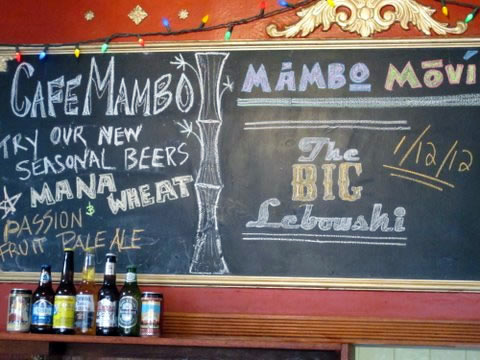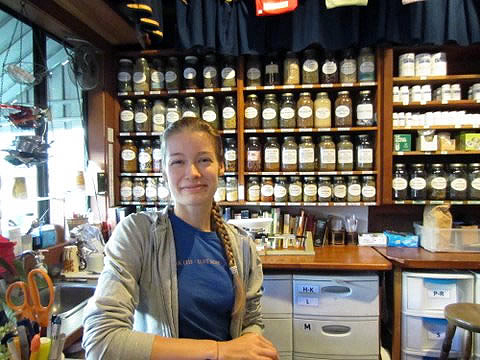Culinary Tourism: Exploring Local Culture through Food
In Maui, Hawaii and Around the World
Article and photos by Zahara Heckscher
 |
| Café Mambo in Paia, Maui, serves tropical fruit beers and Hawaiian and Mediterranean influenced Brazilian food, with weekly movies for locals and tourists. |
“We call it cherimoya.”
Ryan carved into a custard apple as big as my head, and handed me a juicy slice — green scaly rind, black seeds, and white flesh as sweet as sugar cane, with the scent of guava, banana, and passion fruit.
Mana Foods, where Ryan Earehart manages the produce section, was the fourth stop on a recent culinary tour of Paia, a small town in Maui, Hawai’i.
The tour, organized by Local Tastes of Maui, explored the savory side of Paia, once a sugar mill and military town, now riding the ups and downs of the tourist economy.
Locals hope food tours can help the smaller shops and restaurants gain their share of tourist dollars, support the island’s growing sustainable agriculture movement, and at the same time provide tourists with a sample of local cuisine, history, and culture.
Local Flavors, Local Stories
 |
| The Dragon's Den in Makawao has a comprehensive offering of herbal remedies and teas, as well as classes by expert naturalists, and information about the local arts scene. |
Cindi Weldon, originally from Seattle, started Local Tastes of Maui to share her passion for her adopted hometown of Makawao, the cowboy capitol of Maui, and Paia, just down the mountain towards the coast.
“I saw tourists walking around in a daze,” she said. “I wanted to show them the special corners of town, the little restaurants and shops they might otherwise pass by, and the richness of our local history and cultures.”
On the Makawao tour, we sampled the famous stick donuts of the rustic T. Komoda Store & Bakery, in operation since 1916, and refreshed ourselves with honey lemonade served by owner Kathi Sparks at her outdoor Garden Cafe. We learned about the history of Mexican cowboys in the region (known as paniolos, pidgin for espanoles). In their honor we chomped down on fresh guacamole and chips at the Mexican restaurant Polli’s, where the staff stay up overnight preparing the next day’s smoked meats and salsa, and the bartender, a Bette Midler look alike, has worked for 35 years.
In Paia, Cafe Mambo served us a plate of falafel encrusted in sesame seeds, somehow both crunchy and fluffy. At Charley’s, a center for Paia’s music scene, the owner offered us his famous pancakes with coconut syrup.
The tours also wove in local art, including a visit to the Maui Hands gallery of photography, sculpture, jewelry and painting, all by local artists. We admired a whale tail carved in wood by local artist Dennis Holtzer. Minutes later, we bumped into Dennis as he carried another carving into the Dragon’s Den natural herb and tea shop, seeking a crystal to inlay in the wood.
At the nearby Hot Island Glass Studio, hidden behind the Viewpoints Gallery, we watched an artist craft molten glass from the furnace, surrounded by unbelievable transparent creations of jellyfish shimmering through trails of bubbles.
Our tour guide, Cindi, a retired principal, put her teacher persona to good use in the tour, balancing her shepherding role with commentaries about local characters and history.
A Growing Movement: The Intersection of Eco-Tourism, Slow Food, and Responsible Agriculture
Cindi is not alone. Tourist interest in sustainable food, and agro-tourism has grown dramatically in past years.
The small island of Maui features several food tours, including the more in-depth Maui Culinary Tours. Unfortunately, Jeannie Wenger, the proprietor, was out of town when I visited, but tempted me with tales from her tours, which focus on sustainable food and agriculture. Maui Culinary Tours include a full meal prepared by a local chef, a private farm tour, and a visit to the Tedeschi Winery — including the tasting room.
Maui visitors interested in culinary and agricultural tourism can also take tours of the Ali`i Kula lavender farm, the Surfing Goat Diary, and the Ono Organic Farm. Those who drive the road to Hana can visit the Kapahu Living Farm on a cultural tour lead by native Hawaiian guides, and observe traditional crops, including taro, in the Kipahulu section of Haleakala National Park. (See resourse section for these and other Maui culinary experiences.)
Culinary Tourism Around the World: Cooking Classes, Meals on Farms, Farmers’ Markets
With growing international interest in slow food and sustainable agriculture, culinary tourism can be seen as an ecotourism spinoff — eato-tourism — that at its best helps promote environmental stewardship and locally controlled cultural preservation.
Food tourism can range from self-styled informal visits to local farmers markets in New Zealand, to a 2-week formal cooking class in Paris.
Thailand offers a plethora of small cooking schools where tourists (or locals) can take one day classes in basics such as Pad Thai, or regional specialties involving fish, coconut milk, and special blends of spices.
In Mexico, in home cooking classes have sprung up in Tlaxcala, Puebla, Puerto Vallarta, Jalisco, and Oaxaca with lessons ranging from rustic chilaquiles to gourmet stuffed and sautéed squash flowers.
In the US and Europe, some farmers are offering “on the farm” meals that are open to travelers; the organization Out Standing in the Field offers some high-end experiences, but for other farm dinners, you’ll have to search the web by state and town to find local options.
If you travel to a small community with no visible culinary tourism, you can fashion your own tour. Ask at hotels, schools, famers’ markets and restaurants and you’re likely to find out about a farm that you can visit or an up and coming chef (or even a home cook) willing to offer a class.
As with ecotourism, travelers interested in culinary tourism should keep their critical eyes open, as some tour providers are not truly committed to the highest environmental standards of the industry. Visitors are advised to beware of experiences that offer foods such as veal, shrimp, or fish that are not sustainably harvested.
Not Just about the Food
After two days with Cindi, I needed a couple of hours of exercise to shrink back to normal size.
But richer than the food was the chance to connect with people I would not have met on my own — from Ryan with his pride in locally grown produce of Maui to Kathi’s enthusiasm about her honey lemonade. I had the sense that I was joining a community of passionate foodies who believe in a vision of sustainable food and relish the opportunity to share it with visitors.
ZAHARA HECKSCHER is the co-author of the book How to Live Your Dream of Volunteering Overseas, which includes evaluations of over 80 volunteer programs and suggestions for preparing to volunteer. Zahara co-authored a follow-up book which is an instant immediate classic titled "Learning Service: The Essential Guide for Volunteering Abroad."
| Related Topics |
| Culinary Travel |
|
